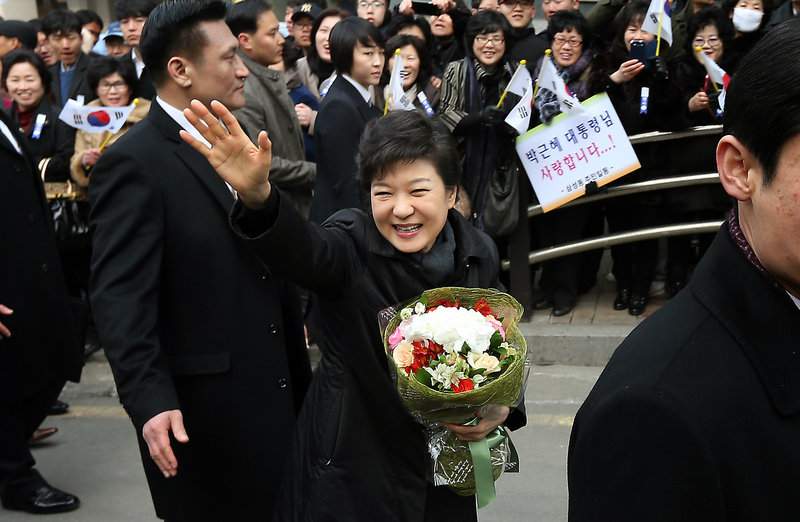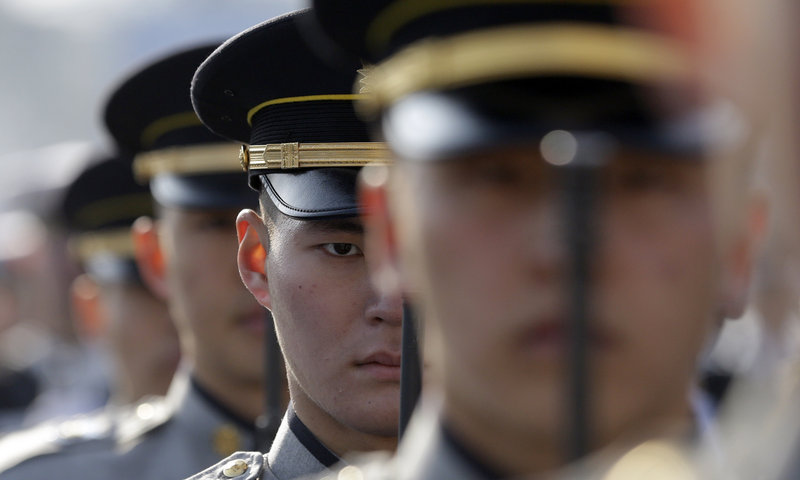SEOUL, South Korea – Park Geun-hye became South Korea’s first female president Monday, returning to the presidential mansion where she grew up with her dictator father.
Park’s last stint in the Blue House was bookended by tragedy: At 22, she cut short her studies in Paris to return to Seoul and act as President Park Chung-hee’s first lady after an assassin targeting her father instead killed her mother; she left five years later after her father was shot and killed by his spy chief during a drinking party.
As president, Park will face stark divisions both in South Korean society and with rival North Korea, which detonated an underground nuclear device about two weeks ago. South Koreans worry about a growing gap between rich and poor, and there’s pressure for her to live up to her campaign suggestion that she can return the country to the strong economic growth her strongman father oversaw.
North Korea’s atomic test will also present a challenge to her vow to soften Seoul’s current hard-line approach to its northern rival.
Pyongyang, Washington, Beijing and Tokyo are all watching to see if Park pursues an ambitious engagement policy meant to ease five years of animosity on the divided peninsula or if she sticks with the tough stance of her fellow conservative predecessor, Lee Myung-bak.
Park’s decision is important because it will likely set the tone of the larger diplomatic approach that Washington and others take in stalled efforts to persuade North Korea to give up its nuclear weapons ambitions.
Park technically took over as the clock struck midnight. Her swearing-in ceremony later Monday was to be attended by tens of thousands, including dignitaries such as U.S. National Security Adviser Tom Donilon, Thai Prime Minister Yingluck Shinawatra and Japanese Deputy Prime Minister Taro Aso. South Korean superstar PSY, who rose to surprising global fame last year with his song “Gangnam Style,” was set to perform.
Park’s first weeks in office will be complicated by North Korea’s warning of unspecified “second and third measures of greater intensity,” a threat that comes as Washington and others push for tightened U.N. sanctions as punishment for the Feb. 12 atomic test, the North’s third since 2006.
That test is seen as another step toward North Korea’s goal of building a bomb small enough to be mounted on a missile that can hit the United States. The explosion, which Pyongyang called a response to U.S. hostility, triggered global outrage.
Park has said she won’t yet change her policy, which was built with the high probability of provocations from Pyongyang in mind. But some aren’t sure if engagement can work, given North Korea’s choice of “bombs over electricity,” as American scientist Siegfried Hecker puts it.
“Normalization of relations, a peace treaty, access to energy and economic opportunities — those things that come from choosing electricity over bombs and have the potential of lifting the North Korean people out of poverty and hardship — will be made much more difficult, if not impossible, for at least the next five years,” Hecker, a regular visitor to North Korea, said in a posting on the website of Stanford University’s Center for International Security and Cooperation.
As she takes office, however, Park will be mindful that many South Koreans are frustrated at the state of inter-Korean relations after the Lee government’s five-year rule, which saw two nuclear tests, three long-range rocket launches and attacks blamed on North Korea that killed 50 South Koreans in 2010.
Park’s policy calls not only for strong defense but also for efforts to build trust through aid shipments, reconciliation talks and the resumption of some large-scale economic initiatives as progress occurs on the nuclear issue. Park has also held out the possibility of a summit with new North Korean leader Kim Jong Un.
Much is riding on Park’s conclusion.
“The overall policy direction on North Korea among the U.S., Japan and South Korea will be hers to decide,” said Victor Cha, a former senior Asia adviser to President George W. Bush. “If Park Geun-hye wants to contain, the U.S. will support that. But if Park Geun-hye, months down the road, wants to engage, then the U.S. will go along with that too. “
Her father was a staunch anti-communist who made no secret of his antipathy toward Pyongyang during his 18-year rule in the 1960s and ’70s. In 1968, 31 North Korean commandos staged a failed raid on the Blue House that ended with nearly all of them dead. In 1974, Park’s wife was shot and killed by a Japan-born Korean claiming he was acting on assassination orders by North Korea founder and then leader Kim Il Sung.
Critics say Park Geun-hye’s North Korea policy lacks specifics. They also question how far she can go given her conservative base’s strong anti-Pyongyang sentiments.
But Park has previously confounded ideological expectations. She travelled to Pyongyang in 2002 and held private talks with the late Kim Jong Il, the father of Kim Jong Un, and her gifts to Kim Jong Il are showcased in a museum of gifts to the North Korean leaders. During the often-contentious presidential campaign, she responded to liberal criticism by reaching out to the families of victims of her father’s dictatorship.
She said in her 2007 autobiography that she visited Pyongyang because she thought her painful experiences with the North made her “the one who could resolve South-North relations better than anyone else.” She also wrote that Kim Jong Il apologized for the 1968 attack.
“I don’t think this latest spike in the cycle of provocation and response undermines her whole platform of seeking to somehow re-engage the North,” said John Delury, an analyst at Seoul’s Yonsei University. North Korea wants a return of large-scale aid and investment from South Korea.
Before the election, Pyongyang’s state media repeatedly questioned the sincerity of Park’s engagement overture. Since the election, however, although regular criticism of Lee continues — one report said he was the “rubbish of history” — the North’s official Korean Central News Agency hasn’t mentioned Park by name, though her political party is still condemned.
Pyongyang sees the nuclear crisis as a U.S.-North Korea issue, Delury said. “From a North Korean mindset, ramping up the tension and hostility with the U.S. does not equal jettisoning relations with the South.”
Park may take a wait-and-see stance in coming months.
Analyst Hong Hyun-ik at the private Sejong Institute in South Korea predicts that the United States will seek nuclear talks with North Korea in a few months, something that could help Park’s efforts to engage North Korea.
“The nuclear test sets back and complicates but does not necessarily doom her engagement efforts over the long term,” said Ralph Cossa, president of Pacific Forum CSIS, a Hawaii-based think tank.
Park warned after the test that North Korea faces international isolation, economic difficulties and, eventually, a collapse if it continues to build its atomic program. But she also pressed Pyongyang to respond to her overtures.
“We can’t achieve trust with only one side’s efforts,” she said.
Send questions/comments to the editors.




Success. Please wait for the page to reload. If the page does not reload within 5 seconds, please refresh the page.
Enter your email and password to access comments.
Hi, to comment on stories you must . This profile is in addition to your subscription and website login.
Already have a commenting profile? .
Invalid username/password.
Please check your email to confirm and complete your registration.
Only subscribers are eligible to post comments. Please subscribe or login first for digital access. Here’s why.
Use the form below to reset your password. When you've submitted your account email, we will send an email with a reset code.